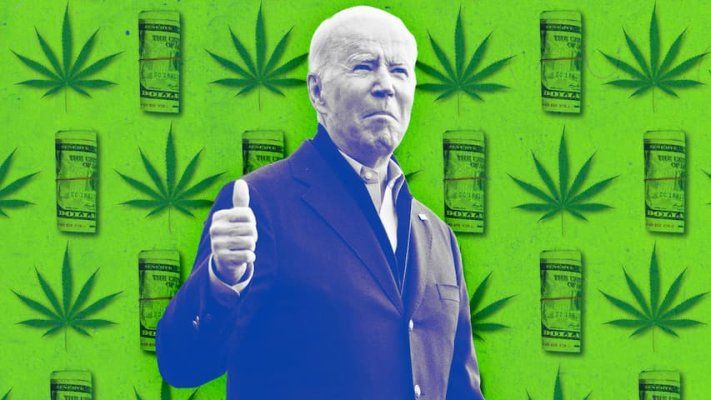In a landmark decision on Friday, President Joe Biden declared a nationwide pardon for all citizens and lawful residents who have previously consumed cannabis, regardless of whether they were formally charged or convicted.
This extensive clemency initiative extends to those who have engaged in personal use of the substance or were found guilty of related federal infractions, as well as to residents of the District of Columbia. However, this reprieve excludes those incarcerated for trafficking marijuana and other related crimes like operating a vehicle under its influence.
The outcome of Biden's action is poised to reshape countless lives as having a criminal record for marijuana offenses has historically restricted access to jobs, housing, and education. Nonetheless, this absolution is not extended to those who infringed upon state laws, and individuals who wish to gain official evidence of their pardon must file through the Justice Department.
This latest directive by Biden surpasses his prior one by encompassing all federal instances of uncomplicated marijuana possession or use, including those who faced no accusations, and by encompassing minor offenses conducted on federal land.
Just days shy of Christmas, it was announced by the White House that numerous individuals with federal and district convictions stand to benefit from this decree.
In a heartfelt address, President Biden spoke against incarcerating individuals merely for possessing or using marijuana and called upon state governors to enact similar pardons, proclaiming the necessity to overturn the injustices inflicted by historically ineffective marijuana policies.
Moreover, Biden has reduced the sentences of 11 convicts, whom he believes had been handed down excessively harsh punishments for peaceful drug-related crimes, in line with lighter modern sentencing standards.
The Congressional Black Caucus recognized these pardons as a stride towards rectifying racial imbalances prevalent in sentencing practices for cocaine-related offenses, which have unjustly targeted the African American community for decades.
Furthermore, the ACLU's Justice Division director, Cynthia W. Roseberry, praised Biden's efforts for their redemptive message and potential to correct past wrongs, though she asserted that legislative change is crucial to safeguard against future policy reversals.
Those wishing to partake in Biden's clemency initiative must undergo a formal application process managed by the Department of Justice to receive a pardon certificate, necessary for validating their clemency in contexts such as employment or housing.
The Biden administration had previously advocated for the DEA to declassify marijuana as a lesser offense, aligning with both a sizeable majority of Americans who, per a recent Gallup survey, and across political and demographic spectrums, agree on the legalization of cannabis.
Presently, the recreational use of marijuana is lawful in two dozen states and the District of Columbia, with medical marijuana approved in a total of 38 states across the nation.
This extensive clemency initiative extends to those who have engaged in personal use of the substance or were found guilty of related federal infractions, as well as to residents of the District of Columbia. However, this reprieve excludes those incarcerated for trafficking marijuana and other related crimes like operating a vehicle under its influence.
The outcome of Biden's action is poised to reshape countless lives as having a criminal record for marijuana offenses has historically restricted access to jobs, housing, and education. Nonetheless, this absolution is not extended to those who infringed upon state laws, and individuals who wish to gain official evidence of their pardon must file through the Justice Department.
This latest directive by Biden surpasses his prior one by encompassing all federal instances of uncomplicated marijuana possession or use, including those who faced no accusations, and by encompassing minor offenses conducted on federal land.
Just days shy of Christmas, it was announced by the White House that numerous individuals with federal and district convictions stand to benefit from this decree.
In a heartfelt address, President Biden spoke against incarcerating individuals merely for possessing or using marijuana and called upon state governors to enact similar pardons, proclaiming the necessity to overturn the injustices inflicted by historically ineffective marijuana policies.
Moreover, Biden has reduced the sentences of 11 convicts, whom he believes had been handed down excessively harsh punishments for peaceful drug-related crimes, in line with lighter modern sentencing standards.
The Congressional Black Caucus recognized these pardons as a stride towards rectifying racial imbalances prevalent in sentencing practices for cocaine-related offenses, which have unjustly targeted the African American community for decades.
Furthermore, the ACLU's Justice Division director, Cynthia W. Roseberry, praised Biden's efforts for their redemptive message and potential to correct past wrongs, though she asserted that legislative change is crucial to safeguard against future policy reversals.
Those wishing to partake in Biden's clemency initiative must undergo a formal application process managed by the Department of Justice to receive a pardon certificate, necessary for validating their clemency in contexts such as employment or housing.
The Biden administration had previously advocated for the DEA to declassify marijuana as a lesser offense, aligning with both a sizeable majority of Americans who, per a recent Gallup survey, and across political and demographic spectrums, agree on the legalization of cannabis.
Presently, the recreational use of marijuana is lawful in two dozen states and the District of Columbia, with medical marijuana approved in a total of 38 states across the nation.




